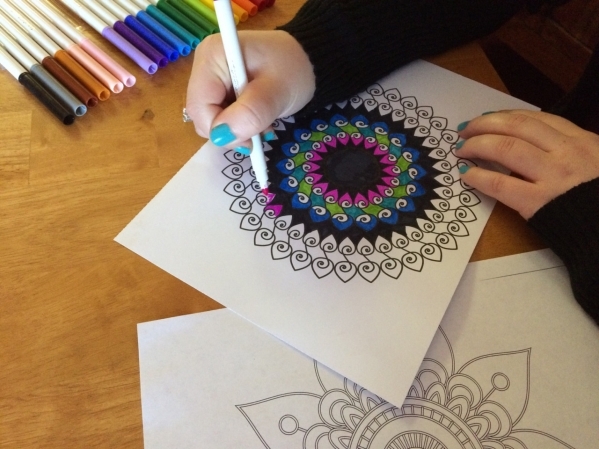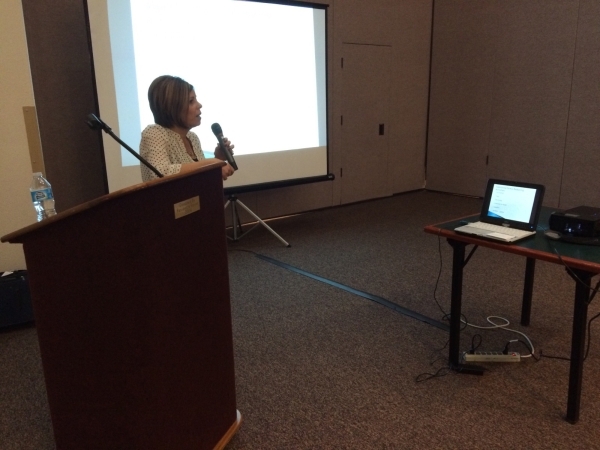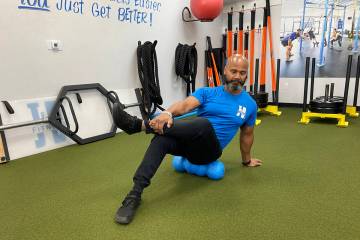Nurse says scent, breathing integral to stress management
Julie McIntosh, a licensed practical nurse and the community education nurse from Compassionate Care Hospice, visited Sun City Summerlin's Desert Vista Community Center in mid-January to talk about managing stress.
Some of those in the audience were eager to hear what she had to say. Milla and Alex Shane may be retired, but they say they still have plenty of stress in their lives.
"I worry about the lives of my children, even though they're grown," Milla said. "But then, I'm the type to worry anyway. I'll find a reason to worry."
Alex said he is concerned about the political situation, drunken drivers on the road, shootings on the news and crime in general. He uses tai chi and swimming three times a week to de-stress.
McIntosh said both activities are good for helping the body shrug off the effects of stress. She outlined other ones in her seminar.
Her first order of business was handing out little bottles of spearmint eucalyptus lotion.
"The sense of smell contributes to relaxation," she said, adding that research shows it alters brains waves. "If you have a favorite scent, it doesn't matter what science says. We have a lot of memories tied to smell. If you recall coming home to the smell of pumpkin pie baking and (have good associations with that), by all means, get some pumpkin and sniff all you want."
The scent of lemon, she said, has been shown to be a natural antidepressant.
According to everydayhealth.com, the leaves and oil of the eucalyptus tree are used for many medical purposes: reducing swelling; clearing nasal congestion; and relieving pain. These properties could all help ease headache pain, though there is no firm scientific evidence to support its use. Full-strength essential oil of eucalyptus should not be taken by mouth or rubbed on the skin. The site also said that peppermint oil is used in aromatherapy for headache as well as muscle and nerve pain.
"In our culture, we're very stressed," McIntosh said. "We tend to live very fast-paced lives and have a lot going on. Most Americans deal with high levels of stress, so it's important for us to learn techniques to lower our stress levels. ... In this digital world, where people email us and expect an immediate response — the texting — but we have to learn ways to deal with it on our own. We can use deep breathing, meditation, aromatherapy — all are different things we can use in the face of chaos so it doesn't have a negative impact on our health."
She said any age can benefit from the techniques.
Not all stress is bad, she added. There is eustress that comes from anticipating something exhilarating — that moment we're poised at the top of a ski slope, about to push off and launch ourselves down the mountain.
Much of our stress comes from our caveman days when the fight-or-flight response was ingrained, she said. While there are no saber-toothed tigers waiting for us to emerge from our rock dwellings, there is the commute to work, the hectic pace of our jobs and worry over loved ones.
The fight-or-flight response is triggered by such situations and floods our systems with cortisol and high levels of other hormones, McIntosh said. The body will put digestion on hold to send extra blood to our legs to run and to our upper body and arms to fight.
Chronic stress is the most debilitating and can lead to poor health. Look at any president and see how gray his hair gets as his term unfolds.
McIntosh had the 24 seminar attendees try deep breathing.
"Most of us breathe very shallowly," she said. "We need to breathe deep into our lungs and have the exchange of bad air for clean air. It's very easy to learn and can quickly decrease our anxiety and nervousness and has a very calming effect."
She said by deep breathing daily for about 10 minutes, we train our bodies to de-stress quickly so that when we encounter a hectic moment, taking a couple of deep breaths will help calm us to better handle the situation.
Deep breathing can be combined with meditation, another de-stressing activity, both of which can help one fall asleep faster.
Another way to manage stress is visualization, which adds to one's level of relaxation.
"So, go to your happy place," McIntosh said. "If it's the beach, start to bring in the other senses, so you feel the ocean breeze, smell the salt air."
McIntosh said not to worry if your mind wanders off with mundane tasks that need attention, that just the act of bringing the mind back to being focused again is therapeutic. She said 10 to 20 minutes a few times a week is thought to be the most effective.
Another modern way to de-stress: Adult coloring books. They tend to involve intricate designs with kaleidoscope-like images and force the mind to focus on the task of coloring them, she said. Like meditation, the single-focus aspect lends itself to a sense of calmness.
— To reach Summerlin Area View reporter Jan Hogan, email jhogan@viewnews.com or call 702-387-2949.





























